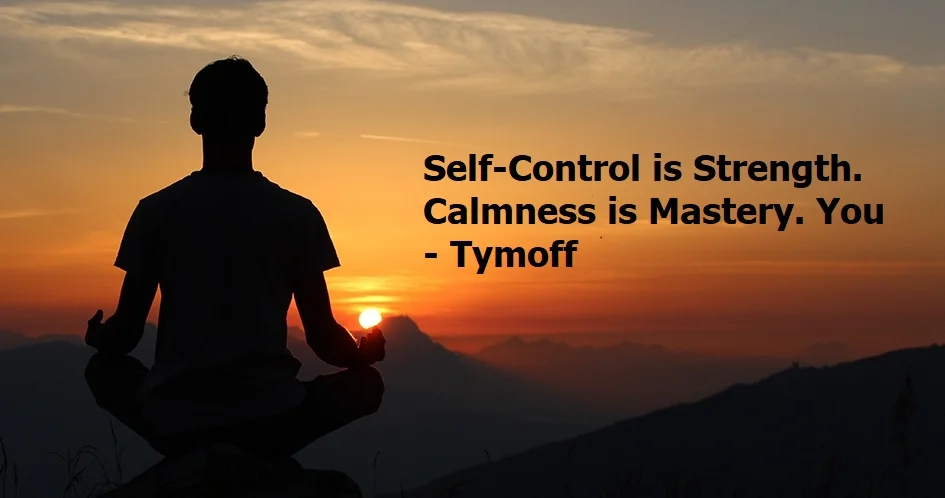In a world constantly driven by impulses, distractions, and external pressures, the idea of self-control and calmness may seem elusive to many. The phrase “Self-control is strength. Calmness is mastery.” captures a powerful concept that resonates across various aspects of personal development, mental well-being, and even success in life. This quote, often attributed to philosophical teachings and popularized by individuals like Tymoff, underscores the importance of mastering oneself to navigate the complexities of modern life effectively.
This article explores the meaning behind this profound statement, its relevance in today’s fast-paced world, and how individuals can cultivate self-control and calmness to achieve personal and professional success.
The Power of Self-Control: A Strength in Every Situation
What is Self-Control?
At its core, self-control refers to the ability to regulate one’s emotions, thoughts, and behaviors in the face of temptations and impulses. It is the internal capacity to delay gratification, resist short-term desires, and maintain focus on long-term goals. Whether it’s avoiding a tempting distraction or restraining from impulsive reactions, self-control acts as the gatekeeper between us and our immediate urges.
Many people equate self-control with willpower. While they are related, self-control goes deeper. It involves the consistent discipline to align actions with one’s values and objectives, even when faced with challenges.
Why is Self-Control Strength?
- Resisting Immediate Gratification: In a world filled with distractions, from social media to instant rewards, having the strength to delay gratification is an incredible asset. Whether it’s resisting the urge to check your phone during work or choosing to exercise instead of binge-watching shows, self-control enables us to prioritize what truly matters in the long run.
- Maintaining Focus: Life is full of temptations that pull us away from our goals. People with strong self-control can remain focused on their ambitions and long-term objectives, even when external conditions push them toward distractions or shortcuts.
- Avoiding Emotional Outbursts: When we control our emotions, particularly during stressful or confrontational situations, we exhibit strength. Emotional restraint ensures that we respond rationally rather than react impulsively, leading to better decisions and healthier relationships.
- Strength Against Adversity: Life is unpredictable, and challenges are inevitable. Self-control provides the strength to face adversity with resilience and patience. It prevents us from panicking, making rash decisions, or giving up when things don’t go our way.
Self-Control in Everyday Life
In daily life, self-control manifests in many forms:
- Diet and Health Choices: Resisting unhealthy food in favor of nourishing your body.
- Time Management: Avoiding procrastination and sticking to a productive schedule.
- Financial Discipline: Saving money instead of spending impulsively on unnecessary purchases.
- Emotional Regulation: Keeping calm during disagreements or tense situations, especially when emotions run high.
Each of these scenarios requires self-discipline, and mastering self-control in one area of life often translates to success in other areas.
Calmness is Mastery: The Importance of a Tranquil Mind
What Does Calmness Represent?
While self-control is about regulating behaviors and actions, calmness is more about managing the inner state of mind. Calmness can be defined as a state of peace, serenity, and mental clarity that remains unaffected by external stressors or emotional turbulence. A calm mind doesn’t react impulsively; instead, it approaches situations with poise, patience, and deliberation.
Why is Calmness Mastery?
- Mental Clarity in Decision-Making: Calmness allows for clear, thoughtful decision-making. When we are calm, we can assess situations objectively, weigh the pros and cons, and make decisions that are aligned with our goals and values.
- Emotional Intelligence: Staying calm enhances emotional intelligence. It enables individuals to understand their own emotions and the emotions of others, leading to healthier communication and better interpersonal relationships. Mastering calmness ensures that one is not swept away by the emotional energy of others, maintaining their center in any interaction.
- Responding vs. Reacting: A calm person responds to challenges; they don’t react. Reaction is immediate and often emotional, while response is measured and thoughtful. Calmness ensures that we take a step back before making decisions, preventing regret over hastily made choices.
- Stress Management: Modern life is rife with stress, but calmness is the antidote. It allows us to manage stress more effectively by not letting external pressures affect our internal state of mind. A calm person understands that stress is inevitable, but they choose how to respond to it, maintaining balance and inner peace.
Cultivating Self-Control and Calmness
Achieving self-control and calmness is a process that requires continuous practice and mindfulness. Below are practical strategies to help cultivate these essential traits.
1. Mindfulness Meditation
One of the most effective ways to cultivate calmness and self-control is through mindfulness meditation. This practice encourages individuals to focus on the present moment without judgment. Regular meditation strengthens the mind’s ability to stay calm and collected, even in stressful situations. It increases self-awareness, helping individuals recognize impulses before acting on them.
2. Set Clear Goals
Clear goals provide a sense of direction. When you know what you’re working toward, it becomes easier to exercise self-control in the face of temptations. Instead of succumbing to distractions, you can focus on the larger picture. Setting SMART goals (Specific, Measurable, Achievable, Relevant, Time-bound) can help keep you on track.
3. Practice Delayed Gratification
Strengthening self-control often requires small, consistent actions. One way to improve this is by practicing delayed gratification. Start with small tasks, such as waiting 10 minutes before eating a treat, or saving money over time for something significant. Over time, the brain learns to resist the immediate desire for a long-term benefit.
4. Cultivate Emotional Awareness
Emotional awareness is key to both self-control and calmness. Pay attention to your emotional triggers and observe how they impact your reactions. By developing emotional intelligence, you can learn to pause before reacting, allowing space for a more measured response.
5. Regular Exercise
Physical exercise is not only beneficial for the body but also the mind. Regular workouts reduce stress, enhance mood, and boost self-discipline. Exercise promotes mental clarity, enabling individuals to handle difficult emotions and situations with greater calm and control.
6. Prioritize Rest and Recovery
An overworked mind or body struggles to maintain self-control or calmness. Ensure you’re getting enough rest, sleep, and downtime to recharge. When well-rested, your ability to regulate emotions and focus on your goals improves.
7. Positive Self-Talk
Often, we can be our worst critics, feeding ourselves negative thoughts that undermine self-control and calmness. Practice positive self-talk by encouraging yourself to stay on track, even when challenges arise. Affirmations such as “I can handle this,” or “I am in control,” help shift your mindset toward resilience.
The Impact of Self-Control and Calmness in Modern Life
The digital age is characterized by instant gratification, constant stimulation, and endless distractions. In this context, self-control and calmness are not just desirable traits; they are essential for maintaining mental well-being and achieving success.
1. Workplace Success
In the professional world, self-control allows individuals to manage their time effectively, resist distractions, and focus on productivity. Calmness, on the other hand, enables professionals to navigate workplace stress, handle challenging situations with grace, and make well-considered decisions.
2. Building Strong Relationships
Both self-control and calmness are essential for healthy relationships. Self-control helps individuals avoid reactive or destructive behavior, while calmness fosters open communication, empathy, and understanding.
3. Mental Health and Well-Being
Mental health is directly influenced by our ability to manage stress and regulate emotions. Calmness reduces anxiety and fosters a sense of inner peace, while self-control helps individuals maintain healthy habits and make choices that benefit their long-term well-being.
Conclusion: The Path to Mastery
“Self-control is strength. Calmness is mastery.” This timeless quote serves as a reminder of the power that lies within us. By cultivating self-control, we strengthen our ability to stay focused, resist temptation, and achieve our goals. Calmness, on the other hand, is the pinnacle of emotional and mental mastery, enabling us to navigate life’s challenges with grace and resilience.
Achieving self-control and calmness doesn’t happen overnight. It requires continuous practice, mindfulness, and the willingness to grow. However, those who embark on this journey find that these traits unlock not only personal success but also a deeper sense of fulfillment and peace. Whether it’s in our relationships, careers, or inner world, mastering ourselves is the first step toward mastering life.






